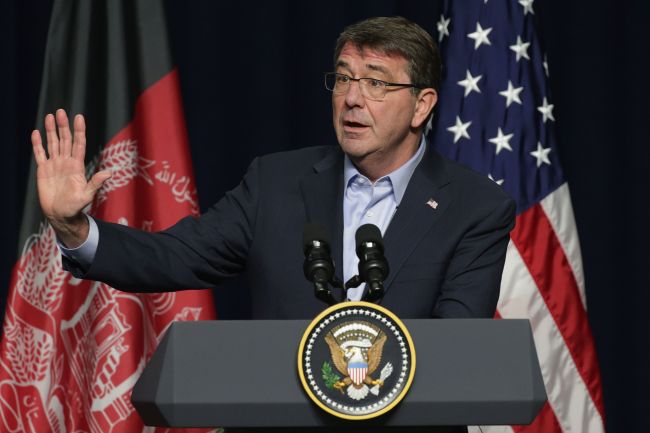U.S. Defense Secretary Ashton Carter is tentatively scheduled to visit South Korea from April 9-11 for talks with Seoul officials over an array of bilateral and regional security issues, Seoul’s Defense Ministry said Tuesday.
His visit was announced amid an intense public debate regarding the U.S.’ possible deployment of an advanced missile defense asset, called Terminal High-Altitude Area Defense, to Korea. Observers expect his visit to set the stage for the allies’ official consultations over the THAAD issue.
 |
U.S. Secretary of Defense Ashton Carter. (AFP) |
Cater is to hold talks with South Korea’s Defense Minister Han Min-koo on the second day of his visit over such pending issues as North Korea’s persistent nuclear and missile threats, and the allies’ efforts to implement the “conditions-based” transition of wartime operational control.
Seoul’s Defense Ministry dismissed the speculation that Carter and Han would touch on the THAAD issue as part of their talks’ official agenda.
“Secretary Carter will visit Seoul to meet with South Korean officials for the first time since his inauguration (last month),” ministry spokesperson Kim Min-seok told reporters.
“As the U.S. has yet to determine whether to deploy a THAAD battery to the U.S. Forces Korea here, that issue is not on the agenda for the talks (between Han and Carter).”
Carter is seen to be in favor of strengthening missile defense against North Korea. During his confirmation hearing last Month, he vowed to use a “full range of capabilities” against missiles and weapons of mass destruction from the communist state, stressing that they pose a direct threat to the U.S.
The THAAD issue has been one of the hottest diplomatic issues as China has explicitly expressed its opposition to THAAD. Beijing argues that THAAD could undermine its security interests, although the U.S. defends it as a defensive system to intercept North Korea’s ballistic missiles.
Seoul has so far taken a cautious stance, arguing that there has been no request from the U.S., no official consultations over the issue and no decision reached yet.
Touching on the public concerns over Seoul being put in a tricky diplomatic position over the potential deployment of THAAD, President Park Geun-hye said in a meeting with her aides that Seoul would make its decision “prudently based on a comprehensive analysis of various pieces of information.”
Should the allies’ defense chiefs not discuss the THAAD issue at their meeting early next month, the allies could also discuss it at their Integrated Defense Dialogue in Washington slated for mid-April, observers say.
The THAAD is a core element of the U.S.’ multilayered missile defense program. It is designed to intercept short-, medium- and intermediate-range ballistic missiles at altitudes of 40 to 150 km during the final phase of their flight, after detecting them with a radar system with a maximum range of about 1,800 km.
The U.S. plans to complete its deployment of seven THAAD batteries in the U.S. mainland, Guam and foreign locations that may include South Korea, Japan and the UAE. One THAAD battery consists of six truck-mounted launchers, 48 interceptors, an air-transportable radar system and a fire and communications element.
By Song Sang-ho (
sshluck@heraldcorp.com)





![[Herald Interview] 'Trump will use tariffs as first line of defense for American manufacturing'](http://res.heraldm.com/phpwas/restmb_idxmake.php?idx=644&simg=/content/image/2024/11/26/20241126050017_0.jpg)

![[Herald Review] 'Gangnam B-Side' combines social realism with masterful suspense, performance](http://res.heraldm.com/phpwas/restmb_idxmake.php?idx=644&simg=/content/image/2024/11/25/20241125050072_0.jpg)
![[Health and care] Getting cancer young: Why cancer isn’t just an older person’s battle](http://res.heraldm.com/phpwas/restmb_idxmake.php?idx=644&simg=/content/image/2024/11/26/20241126050043_0.jpg)